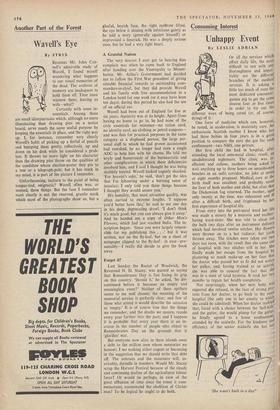Another Part of the Forest
Wave11's Eye
By STRIX
READING Mr. John Con- nell's admirable study of Wavell, I found myself wondering what happens to our visual memories of the dead. The archives of memory are inadequate to hold them all. Time must winnow them, leaving us with—what?
Certainly with some in-
essentials. Among these are small idiosyncrasies which, although no more illuminating than drawing pins on a notice board, serve much the same useful purpose by keeping the essentials in place, and the right way up. I, for instance, remember very clearly WaveWs habit of picking up a fistful of pencils and bumping them gently, reflectively, up and down on his desk while he considered a prob- lem. It throws no more light on his character than the drawing pins throw on the qualities of the candidate whose election-poster they pin to a tree or a telegraph-pole; but it has stuck in my mind, it is part of the picture I remember.
Unforthcoming, taciturn to the point of being tongue-tied, enigmatic? Wavell often was, or seemed, these things. But the face I remember most clearly is not the reserved, granite mask which most of the photographs show us, but a gleeful, boyish face, the right eyebrow lifted, the eye below it shining with infectious gaiety as he told a story (generally against himself) or improvised a limerick. He was a deeply serious man, but he had a very light heart.
A Grateful Nation The very nearest I ever got to hearing him complain was when he came back to England after handing over the Viceroyalty to Mount- batten. Mr. Attlee's Government had decided not to follow the First War precedent of giving sizeable financial rewards to outstanding com- manders-in-chief, but they did provide Wavell and his family with free accommodation in a London hotel for one week (or it may have been ten days); during this period he also had the use of an official car.
Wavell had been out of England for five or six years. Austerity was at its height. Apart from having no home to go to, he had none of the civic essentials for existence—no ration card, no identity card, no clothing or petrol coupons— and was thus for practical purposes in the same category as a displaced person; the large per- sonal staff to which he had grown accustomed had vanished, he no longer had even a single ADC to help him with his chores. He told me wryly and humorously of the bureaucratic and other complications in which these deficiencies involved him, and I said I thought he was being shabbily treated. Wavell looked vaguely shocked. Tor heaven's sake,' he said, 'don't get the idea that I'm labouring under a burning sense of injustice; I only told you these things because I thought they would amuse you.'
His humility, that most attractive quality, was often carried to extreme lengths. 'I suppose you'd better have this,' he said to me one day in his deep, deprecating drawl. 'I don't think it's much good, but you can always give it away.' And he handed me a copy of Other Men's Flowers, which had just reached India. The in- scription began: 'Since you were largely respon- sible for my publishing this . . .' but it was written, not on the fly-leaf, but on a sheet of notepaper Clipped to the fly-leaf: in case—pre- sumably—I really did decide to give the book away.
Forget it?
Last Sunday the Rector of Woolwich, the Reverend N. D. Stacey, was quoted as saying that Remembrance Day is fast losing its grip on this country. 'Should it,' he asked, 'be dis- continued before it becomes an empty and meaningless event?' Neither of these epithets seems to me well chosen; the meaning of the memorial service is perfectly clear, and few of those who attend it -would describe the occasion as 'empty.' ft is of course true that the things we remember, and the deaths we mourn, recede every year further into the past; and I suppose it is probable that every year there is an in- crease in the number of people who object to Remembrance Day on the grounds that it 'glorifies' war.
But everyone now alive in these islands owes a debt to the million men whose memories we honour; I see nothing either cogent or becoming in the suggestion that we should write that debt off. The veterans and the mourners will, in- evitably, dwindle in numbers. Would Mr. Stacey scrap the Harvest Festival because of the steady and continuing decline of the agricultural labour force? Or would he perhaps, in view of the great effiuxion of time since the event it com- memorates, recommend the abolition of Christ- mas? To be logical he ought to do both.










































 Previous page
Previous page